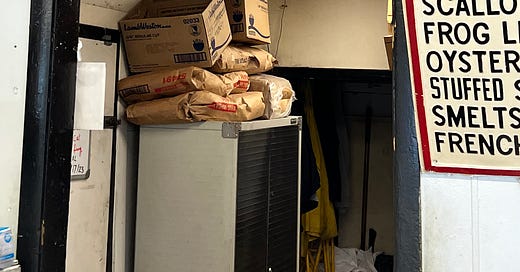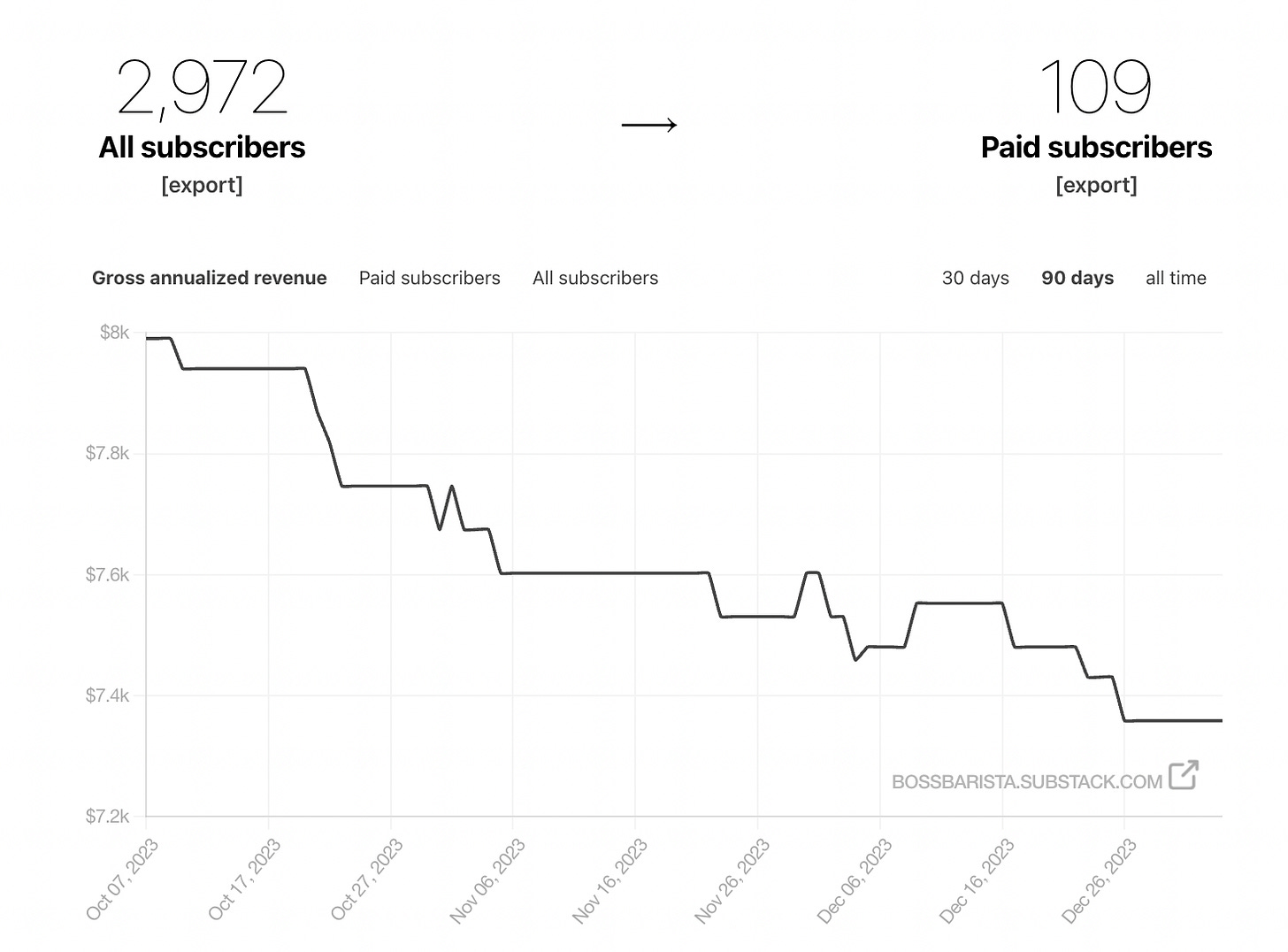In 2024, Stop Expanding
Don’t open a second location. Don’t get a new hobby. Also, scroll down to learn why I ghosted you for all of December.
In August, I took a road trip to Boston. On the way back to Madison, I stopped in Chicago to visit one of my favorite spots, Calumet Fisheries, to pick up some fried shrimp and smelt. Calumet is tiny, barely bigger than a closet. Most patrons (myself included) eat in their cars, which they park along the 95th Street Bridge. While there, I snapped a photo of Calumet Fisheries’ sign, which reads, “This is our one & only location. We have no other stores.”
At this time of year, many of us find ourselves grappling with the idea of growth, expansion, ambition. What do we want to accomplish in the year ahead? How can we be better, and what work do we need to do to get there? We are often expected to do more as time passes: to meet more ambitious goals at work, to make more money, to push our workouts, to delve deeper into our hobbies. The point is that we should never just be satisfied with where we’ve landed. We should always be aiming for something more.
But what if we stopped growing? What would happen if we were forced to look around and assess where we stood instead of reflexively taking a step towards more? My hunch is that we might like where we’re planted.
FINDING VALUE IN WHAT WE HAVE
On a personal level, growth can feel sticky—but in a business sense, pursuing constant growth is seen as a moral imperative. So much so that Calumet Fisheries’ sign feels like a novelty, a preemptive answer to the question, “When will you open a second location?” And for many small businesses, growth and expansion are good ideas: The overhead costs of running a business go down when you have more than one location or you increase your wholesale offerings. I once had a boss who told me he wanted to expand into roasting to give his employees more career opportunities. “I can’t expect them to want to be baristas forever,” he said.
I think he’s right—growing your business gives people room to expand and explore new interests. But I’m not sure many people grow with such a concrete principle in mind. And that’s because growth is baked into our understanding of success. When you look at big companies, for example, their worth is also entirely determined by the value they bring to shareholders. If a shareholder invests with X amount of money, they probably expect their return to yield more than what they started with.
Small businesses don’t have shareholders, but I’d argue that the idea of growth without clear intention or intrinsic value to a business and the people who actually work within it has still trickled down. Many of us no longer question why we want to pursue growth beyond profit. It just seems like an inevitability, a law of nature.
Don’t get me wrong; I understand there’s a difference between, “This business is barely getting by,” and “We’re finally making enough money so that I don’t have to work 80 hours a week.” The factors that make a business viable change over time, due to inflation, rising rents, fluctuations in customer foot traffic, and changing tastes. And I certainly don’t think business owners need to martyr themselves and shoo away money and growth opportunities to prove they’re “good.”
But if you’re a boss who keeps reaching for more, who says things like, “My employees make more money than me,” please suck rocks because a) I don’t believe you, and b) there’s no intrinsic value to that statement. That’s kind of the whole point: There’s no intrinsic value to growth, and our fixation with it has robbed us of the ability to take stock of and place value in what we already have.
STASIS ISN’T A BAD WORD
In our capitalistic society, the opposite of growth is not to shrink or wither, but to be in stasis. That’s a shame, because I think our obsession with growth removes our ability to sit with what we have and make concrete goals with an endpoint, ones that express our values and feel intentional.
I think about growth all the time—it’s a sentiment I’ve expressed here before—because Boss Barista makes some money, but not a lot of money (below is a screenshot of the money we make through paid subscriptions; add to that about $200 a month through Patreon). For months, I thought my goal was to grow and gain more paid subscribers. I don’t think that’s changed, but I have come to see my original goal as sort of thoughtless.
Who am I growing for? I didn’t (and still don’t) have an answer for that. When would enough growth be enough? If I got hundreds of paid subscribers and made enough for Boss Barista to support my entire living, would I turn away new paid subscribers? Did I even want to do this full-time? I don’t think the answer to any of these questions is bad. I don’t think wanting this to be my sole job or wanting people to pay for the work is bad. It’s just that I simply don’t have an answer to these questions, and I think that’s where growth can feel like a trap.
As for Calumet Fisheries, the business is going through sort of a weird period. (It was temporarily shut down due to health code violations, and then, days after reopening, suffered an electrical fire that will keep it closed for months.) But I still think about that sign almost every day. How do we assess what’s enough? How do we determine our goals, have the confidence to adhere to our plans, and marvel at our work when we achieve our goals? How do we prevent a capitalistic growth mindset from robbing us of the joy of basking in what we have or are working towards?
This post isn’t a resolution—it’s more like a thought experiment for 2024, a license to look around and do less. Let this be the year we don’t add to our to-do list simply because it looks short. Let this be the year our accomplishments matter for longer than their initial arrival. Let this be the year we write down our goals and, when we check them off, pause for a moment before adding new ones. Let this be the year we feel satisfied with what we’ve done, and allow ourselves to really take in those feelings.
With that in mind, I ghosted you all this December. I’m sorry I departed the platform without even an explanation, but I’m also working through where this expectation comes from. Perhaps this experiment—thinking about growth—also has to do with the standards we set for ourselves, and if the standards and measures of success we follow come from outside ourselves or are self-imposed. Did any of you get mad at me for not posting, or did I make up the expectation of pushing out content at a certain cadence?1
That said, I do plan on getting back on track in terms of publishing podcast episodes, but I can’t promise I’ll hold to as strict a schedule as I’ve created in the past. The last month of the semester (remember, I’m in journalism school now!) really rocked me, and I ended up producing some pretty cool work for my courses. But I had to realign my own expectations of how much I could produce—and sadly, that meant taking time off from Boss Barista for a few weeks.
But boy, howdy do we have some good interviews coming up soon. Thanks for being here with me, and I’m looking forward to sharing them with you.
If you did get pissed and you’re a paid subscriber, please email me.






I just had this conversation yesterday. Someone asked if I would open another location and I said I had tried and it wasn’t the end all be all answer I thought it would be. It was expensive and I didn’t feel I could spread myself out that way. There’s this push to expand because of the reasons you outlined, and I think it’s also intrinsic in capitalism: always pushing for more profits, more money, more access to capital. I’m not good at capitalism and frankly, I hate it, I just try to play the only game we have here. I wish I had had this self-actualization prior to open a second store. Once again you are wise beyond your years Ashley.
I noticed you were missing in December and I thought, good for her!
Welcome back! I definitely did miss you in my inbox but I fully understand the feeling of life just being too full and needing to dial back on some aspects. I hope you had a great month focusing on Grad School stuff!
I think about the notion of "enough" all the time. I see lots of people in my life constantly wanting more. My partner always wants more guitar pedals (how many does one need?), my mom buys new furniture for her home what feels like every couple months, my brother has an unfathomable sneaker wall. With material stuff I especially think about the capitalism and consumerism aspects and how that's terrible for the planet, but I also personally get very overwhelmed if there are too many "things" around me.
The idea of wanting more of that sort of intangible "growth" is something I've been slowly letting go of more and more each year. It especially hit me when there was a possible opportunity for my boss to receive a promotion and me to take her role. I looked at her responsibilities and looked at mine and realized that I really liked doing what I was doing. If growth meant leaving the stuff I was doing behind, then I didn't want that. That was what really pushed me to remove myself from the "climb the corporate ladder" mentality and consider that I could be happier at a "lower" level and making enough money to live decently.